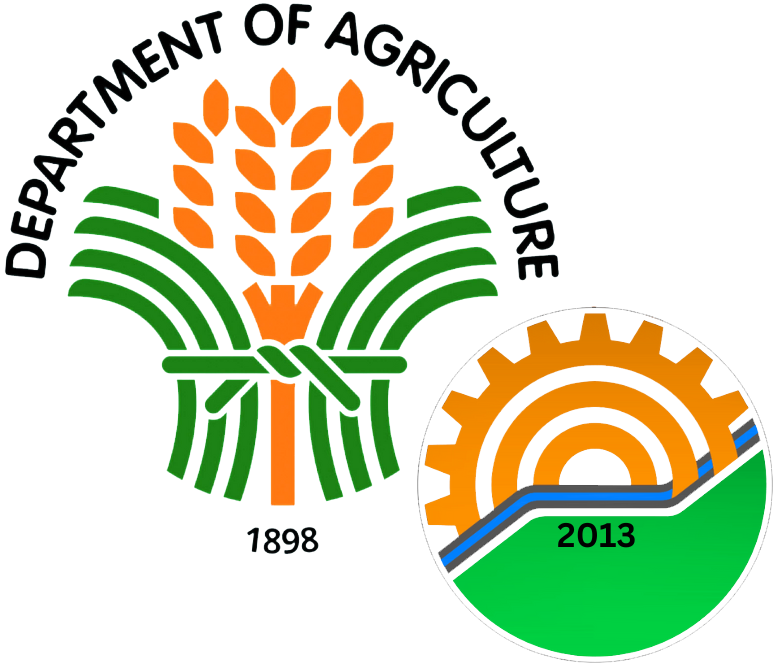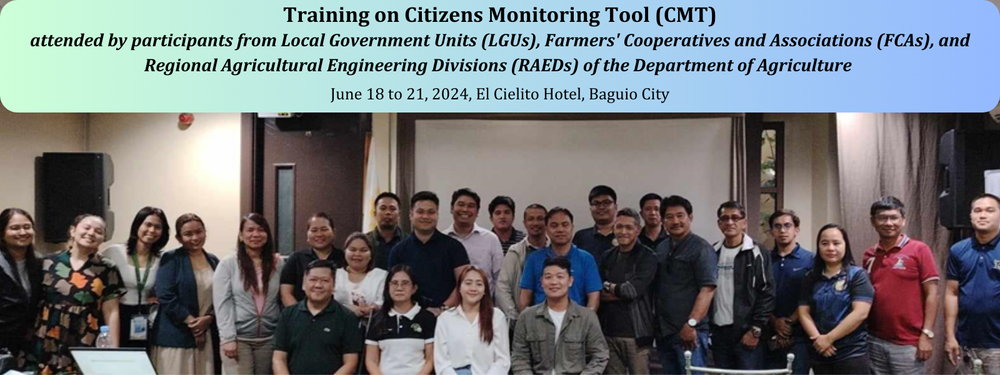

DEPARTMENT OF AGRICULTUREBUREAU OF AGRICULTURAL AND FISHERIES ENGINEERINGSugar Center, Annex II Building Extension, North Avenue, Diliman Quezon City




Baguio City — In efforts to enhance the oversight capabilities of agricultural infrastructure project beneficiaries, the Department of Agriculture – Bureau of Agricultural and Fisheries Engineering (DA-BAFE) conducted a four-day training session on the Citizen’s Monitoring Tool (CMT). Participants of the training were equipped with the necessary skills and knowledge to effectively monitor DA-funded infrastructure projects.

Thirty-one (31) representatives from the Department of Agriculture’s Regional Agricultural Engineering Divisions (RAEDs), Local Government Units (LGUs), and Farmers’ Cooperatives and Associations (FCAs) participated in the Citizens Monitoring Tool (CMT) training from June 18 to 21, 2024 at the El Cielito Hotel in Baguio City.
The diverse group of participants underscores the CMT’s core principle of empowering local stakeholders to actively ensure the quality and efficiency of DA projects in their communities.
Participants engaged in a series of lectures, discussions, and practical applications of the CMT throughout the training. Key topics included proper documentation procedures, grievance redress mechanisms, and the use of Applied Geotagging (AGT) for precise, location-specific reporting. The training also covered the interpretation of Detailed Engineering Designs, essential for understanding construction blueprints.
A site visit to the Baguio City Animal Breeding and Research Center, where participants applied their newly gained knowledge to inspect ongoing construction projects, was a highlight of the program. Using CMT forms, participants identified areas for improvement, documented their observations, and gained practical experience with the tool’s applications.
Several challenges were encountered during the training. Some participants from FCAs found the CMT to be complex, suggesting a need for simpler learning materials. Discussions emphasized the importance of clear communication and collaboration among stakeholders, including LGUs, DA representatives, and beneficiary communities, to maximize the tool’s effectiveness.
Recognizing the potential of the CMT to transform the monitoring of DA projects, participants remained optimistic. Increased transparency, early identification of potential issues, and enhanced community ownership were benefits that were widely acknowledged.
In response to the feedback, BAFE plans to address the concerns by developing clearer guidelines for CMT implementation, simplifying learning materials, and organizing regional training sessions to ensure broader participation. The CMT training is an important initiative towards ensuring that DA-funded projects are executed to the highest standards with active community involvement. As the training concluded, the participants left with a sense of commitment and readiness to implement the CMT in their respective communities and contribute to the effective monitoring of agricultural infrastructure projects across the country. ###DA-BAFE ICTST
As of
As of
As of




All contents are in the public domain unless otherwise stated.
Learn more about the Philippine Government, its structure, how Government works and the people behind it.

Sugar Center, North Avenue, Diliman, Quezon City.
